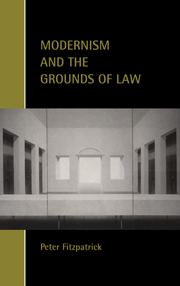3 - Law
Published online by Cambridge University Press: 05 July 2014
Summary
How many priests
How many morning glories
Have perished under the pine
Eternal as law?
(Basho 1966: 56)INTRODUCTION
If then we find in law the triumph of a departed world, that world nonetheless departs with its empyrean leaving law bereft of any originating reference exterior to it. Coming from within itself, as it were, modern law was revealed in the Freudian myth as absorbing the dimensions of the origin, as linking that which is determinantly originated with what lies ever beyond the origin. True, as we saw, modernity does purport through such telling instances as society to combine these dimensions, but it was unable to encompass them in this way and account for law. Instead these instances relied on law as a cohering of those dichotomous dimensions.
That pattern of analysis does not account for law in itself, for law as self-grounding. It evokes a necessary law in different instances and, although these are significant and related, they do not cohere into some encompassing milieu producing law. How then may law be presented in itself when that ‘itself’ is so divided between determination and responsiveness? The strategy used here is to see law as taking place with-in the seeming imperatives of action, time and space. What more or less immediately emerges from that exercise is somewhat tautologous in that the movement in and between determination and responsiveness which in-forms law is what also gives us action, time and space – gives us, at least, the experiential conceptions of them explored here.
- Type
- Chapter
- Information
- Modernism and the Grounds of Law , pp. 70 - 108Publisher: Cambridge University PressPrint publication year: 2001

